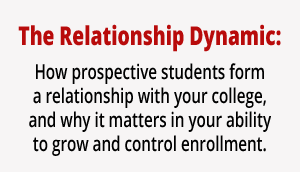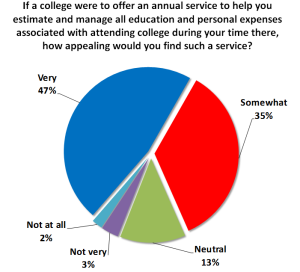“The admissions department never sleeps,” an enrollment manager shared with me recently. “On one hand I still have a handful of spaces to fill for the upcoming class plus an anticipated summer melt of around 10%, and on the other, we are full-swing into our recruiting efforts for next year. Summer is no longer a quiet time for us.” Sound familiar?
Wouldn’t it be great it there were one singular, powerful tool that could help you combat the dreaded summer melt AND shore up your ongoing recruiting efforts?
 Good news: Improving your pre-enrollment customer service delivery, all the way up to the point of registration, can help you reduce melt and positively impact your ability to truly close the sale with students who have deposited. A recent nationwide study conducted by Longmire and Company of nearly 5,000 prospective college students and parents showed that 53% reported that their decision to enroll in a given school was heavily influenced by the level of service they received during the “college shopping” process. As we all know, for many students the shopping process continues well beyond the point at which they make a promise to enroll.
Good news: Improving your pre-enrollment customer service delivery, all the way up to the point of registration, can help you reduce melt and positively impact your ability to truly close the sale with students who have deposited. A recent nationwide study conducted by Longmire and Company of nearly 5,000 prospective college students and parents showed that 53% reported that their decision to enroll in a given school was heavily influenced by the level of service they received during the “college shopping” process. As we all know, for many students the shopping process continues well beyond the point at which they make a promise to enroll.
Our study found that poor service delivery, across any brand touch point on campus, often outweighs other important factors, including strength of academic programs, faculty reputation and even the financial aid offered. Prospective students and parents view the pre-enrollment service they receive as predictive of how the student will be served after enrolling. They will change their mind about a college or avoid it altogether if they receive poor service.
To avoid losing students before classes start, be sure to give them a stellar experience everywhere and at all times. Students and their parents agreed that a single bad experience can be the catalyst for completely derailing the prospective student’s original enrollment plan. The most often cited negatives include unkempt grounds, buildings and restrooms; lack of clear signage; unfriendly staff and faculty; excessive phone hold times; unresponsive staff; and overwhelming paperwork.
Just as importantly, the study concludes that offering great pre-enrollment service will not only “save” enrollments but it is also one of the best possible ways for a college or university to differentiate itself in today’s competitive environment.
Certainly, every communication, every interaction, every brand touch-point with a prospective student and/or parent has the potential to make or break the relationship that you have worked so hard to establish. You may know this, but does every other member of the team? And, by “team,” I mean every person at your college whose actions may influence the student’s decision and ultimate action. Certainly, interactions with faculty, admissions and financial aid are critical, but many schools are surprised to find the impact that campus maintenance, grounds keeping, security and even the switchboard operators can have on creating a lasting impression.
What is the first step?
We suggest you take a walk. Yes, you read that correctly. Sure, fresh air and exercise always does a body and mind good, but the primary impetus for this walk is to experience your campus from the perspective of prospective students and their parents. This walk could very possibly save you enrollments. Every college should have a comprehensive pre-enrollment customer service program in place. Whether you do or not, a self-audit is a must to help you identify and correct any service gaps.
Specifically, here are some of the questions you should be asking yourself during your campus stroll:
- Are the grounds, pathways, and buildings
 pleasing to the eye, clean and well-kept?
pleasing to the eye, clean and well-kept? - Are the restrooms in all the public areas well-stocked and clean?
- Is signage easy to read and accurate? Are maps intuitive and understandable?
- Are information areas easily identifiable? Are they properly staffed with friendly faces?
- Are staff and faculty interacting pleasantly with the students and visitors?
Here are some of the questions you should be asking about your continuing interactions with students:
- Are we providing students with the information they need, when they need it?
- How are we continuing to make students and parents feel wanted?
- Are we continuing to build on the student’s excitement about attending?
When you return to your office, consider making a few phone calls, too. Not as a member of the admissions team, but as a prospective student or parent. You need to know if calls are answered pleasantly, promptly, and quickly routed to the appropriate party; if the hold times are minimal; and if each call is handled to the complete satisfaction of the caller.
Next, review your forms and processes and ask yourself this key question: Are they user-friendly? If not, how can they be simplified?
We suggest asking your entire admissions team and other department representatives to “take a walk,” too. Not only will their involvement offer unique insights but it may also facilitate necessary improvements after they are identified.
We are seeing a growing trend in the industry among colleges large and small, public and private, paying much more attention to their campus-wide customer service delivery. Some people on campus may still believe that students are not customers. And that colleges are exempt, by their nature, from having to measure their service delivery in the same way as other organizations. But the data we collect through the Service Quality Management assessments we conduct for clients clearly show that students and parents have the same expectations of service delivery with regard to colleges as any other enterprise with which they do business.
With so many contributing factors, it can be a challenge knowing where to start on a pre-enrollment customer service improvement initiative. Your audit is a good start and should be followed up with a baseline measurement to determine where you stand now vs. where you need be. One college president at a major Eastern university summed it up like this, “We invest millions of dollars in recruitment and yet we discovered that there were changes that cost very little that greatly impact our efforts.”
We help colleges and universities with their recruiting efforts every day, including offering Service Quality Management (SQM) to help you measure and manage your pre-enrollment service. If we can help you, please let me know.
Continue the conversation on Twitter @LongmireCo. Be sure to Subscribe to Versions of Conversion today so you don’t miss any of this highly-valuable information.
 Karen Full is a highly-respected higher education professional who has held positions in admissions and enrollment management at several institutions in the Midwest and Florida. With her vast experience working with large and small, public and private colleges, Karen brings a valuable perspective to her role as an Enrollment Strategist at Longmire and Company. Call Karen at 913/492.1265 x.711 or email her at kfull@longmire-co.com. Follow Karen on Twitter @KarenAFull.
Karen Full is a highly-respected higher education professional who has held positions in admissions and enrollment management at several institutions in the Midwest and Florida. With her vast experience working with large and small, public and private colleges, Karen brings a valuable perspective to her role as an Enrollment Strategist at Longmire and Company. Call Karen at 913/492.1265 x.711 or email her at kfull@longmire-co.com. Follow Karen on Twitter @KarenAFull.


 The answer is: Take a personal interest in the prospective student.
The answer is: Take a personal interest in the prospective student. 




